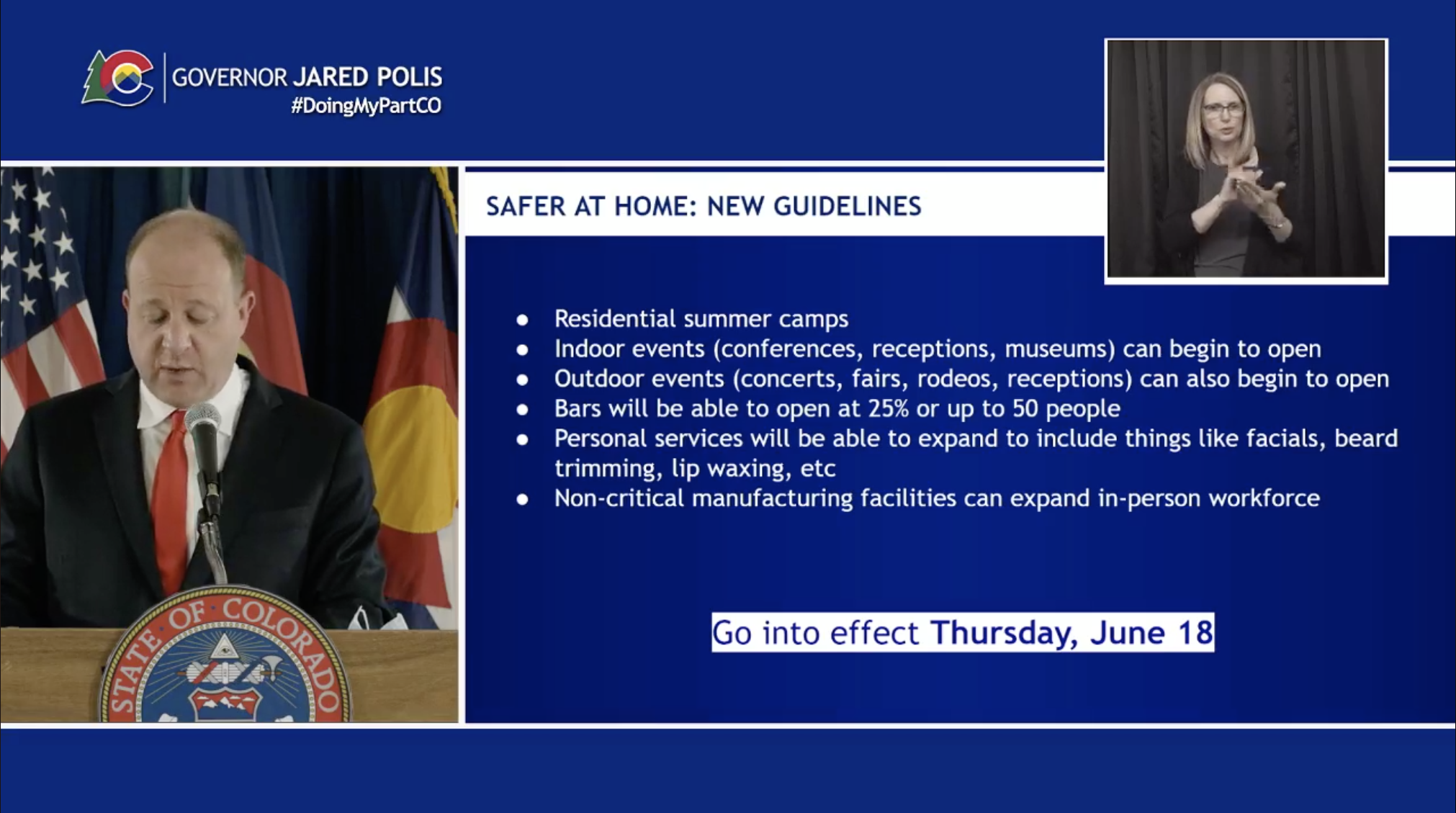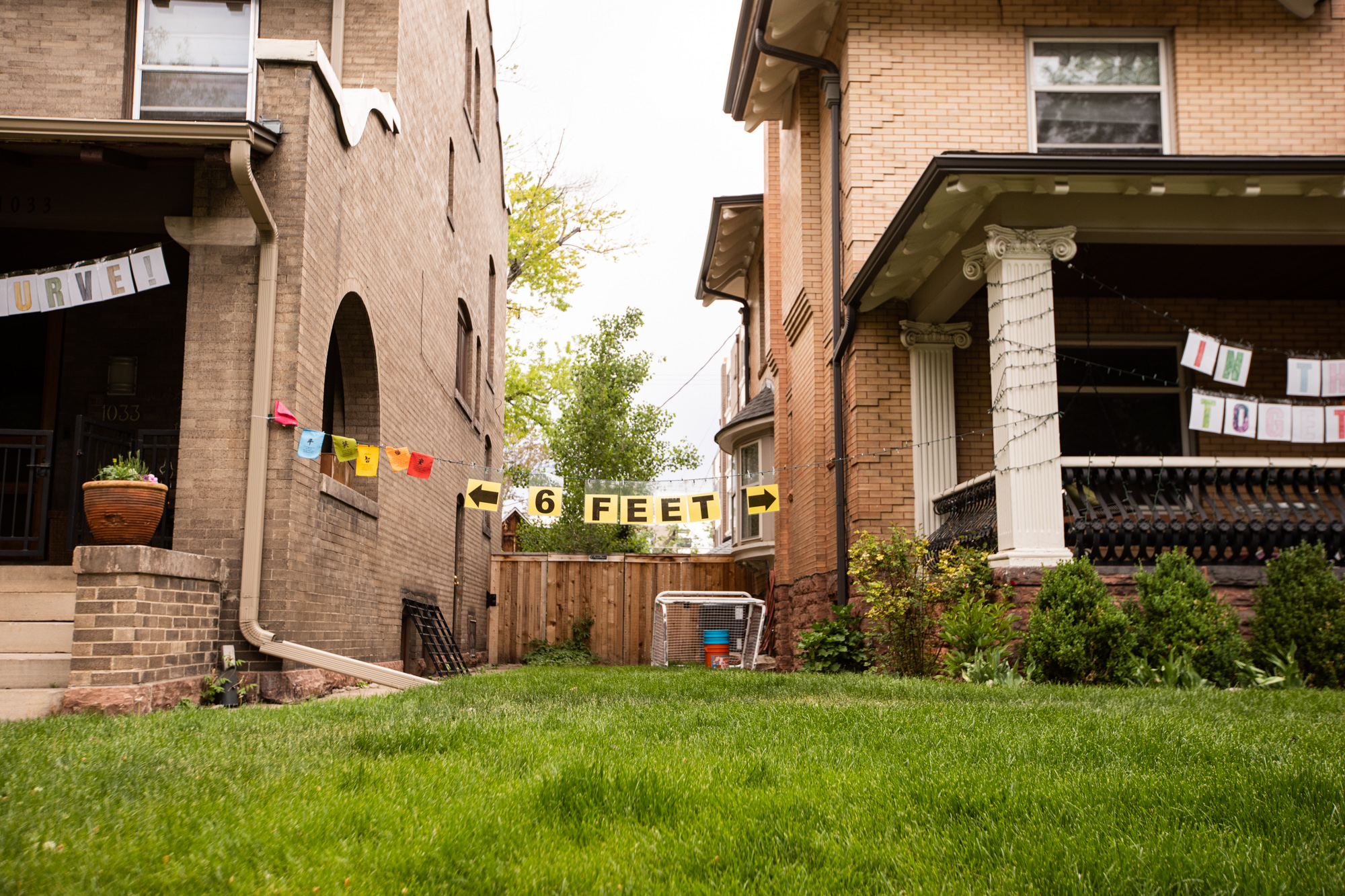[Update on June 22 at 4:30 p.m. On June 18, the city approved the updates to the Public Health Order 20-28 for the Safer at Home and in the Vast, Great Outdoor Phase. The amended order includes additional guidance for higher education and manufacturing which have been added to this article under The New Guidelines.]
In a Monday news conference, Governor Jared Polis announced a new round of safer-at-home guidelines, along with the next phase in response to the COVID-19 pandemic.
Polis began by sharing the good news of the downward trend of COVID-19 cases on 12 of the last 14 days in the state.
“We’re only just a few steps ahead of this virus,” he said in the news conference. “We’ll only continue to move the right way if Coloradans continue to use precautions.”
As a result, many of the existing guidelines will stay the same — such as wearing masks and social distancing. However, Polis did announce some changes to the safer-at-home guidelines, that we’ve detailed below. The new round of guidelines is currently a draft open for comment through Wednesday, June 17, and will be finalized and go into effect Thursday, June 18.
The New Guidelines
- Personal services that do not permit masks — like facials, waxes and shaves — are allowed to resume
- Residential camps are allowed to resume with lower capacity, no more than 25 campers in a group. Go here to read the guidance for personal services.
- Submit feedback using this online form.
- Indoor events, like conferences, theaters, museums, concerts and receptions etc., can start with a capacity limit of 25% up to a certain limit based on square footage. Social distancing guidelines must still be followed. Go here to read the guidance for indoor events.
- Submit feedback using this online form.
- Outdoor events, like concerts, fairs, rodeos and other outdoor venues, etc., can begin at a limit capacity of 50% up to a certain limit based on square footage. Social distancing guidelines must still be followed. Go here to read the guidance for outdoor events.
- Submit feedback using this online form.
- Bars can re-open with a capacity limit of 25% up to 50 people with more options for outdoor seating. Go here to read the guidance for restaurants and food services.
- Higher education institutes may open up to 50% capacity per room or a maximum of 50 people. However, remote learning is still greatly encouraged. Go here to read the guidance for higher education.
- Manufacturing may resume with up to 50% capacity per room or up to 50 people, whichever is fewer. Worksites must implement procedures that ensure social distancing of 6 feet between employees. Go here to read the guidance for non-critical manufacturing.
- These will go into effect Thursday, June 18
Other Updates: Alcohol To-Go and Delivery

Bottled Cocktail at Brass Tacks. Photo by Brittni Bell Warshaw.
The Colorado Legislature just passed the Alcohol To-Go and Delivery bill which extends the purchase of alcohol to go for another year.
The Senate Bill 213 passed 31-1 in the Colorado Senate and 65-0 in the Colorado House of Representatives but still needs to be signed by Polis to be put into law. But considering his past statements where he’s claimed “The state is going to waive every rule and regulation we can,” in regards to supporting the restaurant industry, it’s very likely he will sign it into law.
The final draft of the bill allows the following:
- On-premise liquor licenses to continue to sell alcohol for off-premises consumption through takeout or delivery until July 1, 2021.
- Alcoholic beverages must be sold in a sealed container for deliveries.
- A sealed container is either the original sealed container or a container that complies with the rules of the Liquor Enforcement Division.
- All deliveries must be made by a person who is 21 years of age or older and an employee of the licensee.
- Once the state of emergency is over, on-premise retailers must limit the total sales of alcoholic beverages via take-out or delivery to 50% to their total annual food and beverage sales. Individuals would also be limited to a specific amount of take-out purchases.
Next Phase: Protect Our Neighbors

Photo by Amanda Piela.
Additionally, Polis gave insight as to what the next phase might look like. Called Protect Our Neighbors, it would allow Coloradan communities a path to further re-open if they can demonstrate strong public health and health care systems.
In order for communities to take more control of their re-openings, they must qualify by meeting the following scientifically based thresholds:
- Lower transmission levels
- Treat patients and handle any surge in need for intensive hospital care
- Conduct testing and effective case investigation, contact tracing, and outbreak response
If these items are met, all activities will be able to occur at 50% up to 500 people with six feet of social distancing according to the current drafted framework. Then if transmissions levels hold steady and counties can meet the above criteria, these restrictions may be raised to 60% or 75% of occupancy.
The new Protect Our Neighbor guidelines will be open for comment for 48 hours and will be finalized on Thursday, June 18 and will go into effect most likely at the end of June or early July and will be enacted based on your county’s performance. For more specific info on your county go here. To submit feedback, use this online form.
—
Polis made it clear the threat of COVID-19 is far from over. “This is a marathon, not a sprint, and we have to find a way to sustainably live with this virus in our communities until there is a cure or vaccine. If we can continue to wear masks, stay six feet away from others and empower our local public health agencies to meet the needs of their communities, then we can rely on these tools to flatten the potential second wave and reduce future outbreaks,” Polis said.
